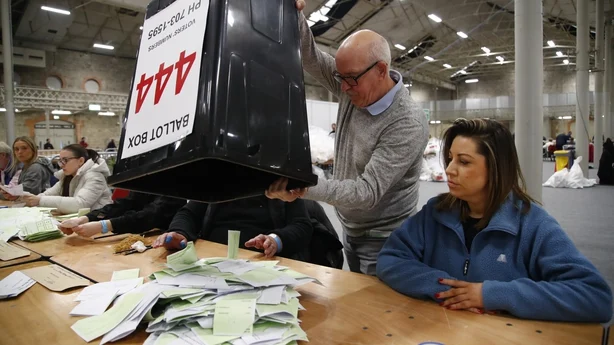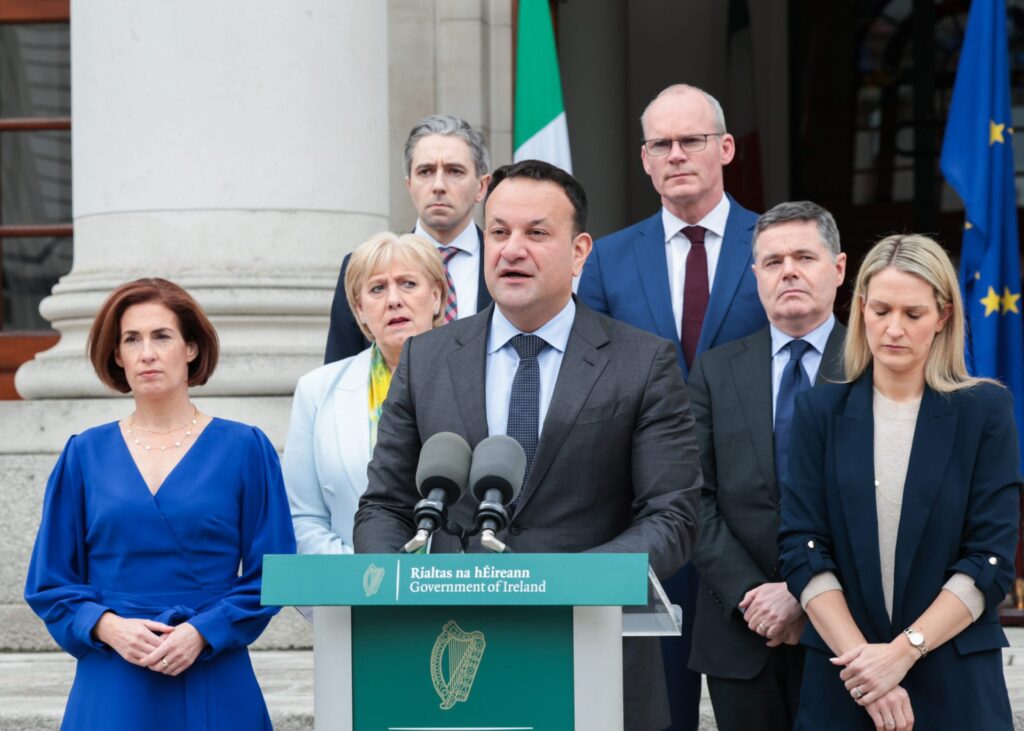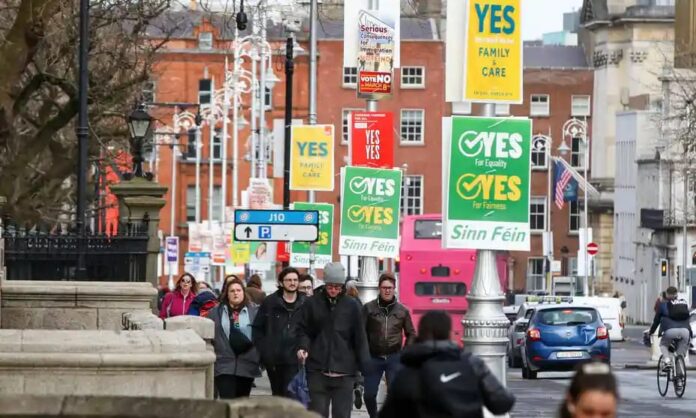Ciaran Mulholland
Voters overwhelmingly reject changes to Constitution
On Friday 8th of March, voters delivered the largest defeat in history for a referendum put forward by the Irish government. They voted to reject proposed changes to the “Family” clause in the Constitution by 68% to 32% and the “Care” clause by a record 74% to 26%. Turnout was 44%, a sharp drop from the last referendum in 2018 of 64%.
The scale of the defeat was a humiliation for the government parties-Fine Gael, Fianna Fail, and the Green Party-but also the opposition parties and so-called “civil society” advocacy groups who had united to support a “Yes-Yes” vote.
Right and far right individuals and groups, and conservative Catholics, have sought to claim credit for the outcome. The result has been contrasted to the 2015 same-sex marriage referendum and the 2018 abortion rights referendum which resulted in progressive change and seemed to mark Ireland’s arrival as a modern secular, liberal state. Some on the right are claiming that the referendum marks an end to the onward march of the “woke” agenda with former Fianna Fáil Minister, Willie O’Dea proclaiming it’s time “to stop playing to the woke gallery”,
But the truth is much more complex, as Hugh Linehan, Deputy Editor of the Irish Times (March 16th) argues: “….the result remains hard to read. The amendments were ultimately defeated by a patchwork coalition of wildly disparate parts that are unlikely ever to come together again. Gender-critical feminists stood alongside anti-abortion activists. Rural social conservatives voted the same way as urban Trotskyists”.
The 1937 Constitution-A reactionary document
The government held the referendum on International Women’s Day and posed it as an opportunity to widen the definition of family from a relationship founded on marriage to “durable relationships” such as cohabiting couples and their children. The care amendment proposed replacing a reference to a “mother’s duties in the home” with a clause recognising care provided by family members. Initially polls suggested that the referendum would be passed. It seemed inconceivable that a majority would support the continuation of the reactionary language of the 1937 Constitution.
The 1937 Constitution replaced the earlier Constitution of the “Irish Free State”, which had been in effect since independence in 1922. The Free State constitution resulted from the Anglo-Irish Treaty which ended the War of Independence from Britain. The Treaty resulted in a civil war which was won by pro-Treaty, right-wing forces. The anti-treaty forces refused to enter the institutions of the state for a period of some years but in time many of the oppositionists accepted that abstentionism was not working. Led by Éamon de Valera the Fianna Fáil party entered the Dail in 1926 and formed a government for the first time after winning the 1932 general election.
De Valera was a conservative Catholic and personally supervised the writing of a new Constitution with significant input from John Charles McQuaid, from 1940 the Catholic Archbishop of Dublin. Other religious leaders who were also consulted but there was no doubt that the new Constitution was imbued with a conservative Catholic ethos. A draft of the constitution was presented personally to the Vatican for review and comment on two occasions prior to it was tabled in Dáil Éireann (the Irish parliament) and presented to the Irish people in a referendum.
There were loud voices in opposition. Feminist Hannah Sheehy Skeffington argued that the rights of women would be set back and the Women Graduates’ Association, the Joint Committee of Women’s Societies and Social Workers, and the Irish Women Workers’ Union organised a two-month campaign of opposition. The left-wing Republican Congress called out the “stone-age conception of womanhood”, condemned the Constitution for upholding private property as a sacred, ‘natural right’ and its support for capitalism was ‘something ordained by Providence forever, amen!’ In the words of veteran socialist Peader O’Donnell the ‘Roman Catholic Bishops of the South now functioned as ‘the watchdogs of the private property classes’.

The Proposed Changes
In a series of referendums some of the most reactionary clauses in the Constitution have been overturned, or new clauses with new rights have been added. This was expected to happen again but did not.
The referendum proposal was to replace the existing Family clause which states:
“The State recognises the Family as the natural primary and fundamental unit group of Society, and as a moral institution possessing inalienable and imprescriptible rights, antecedent and superior to all positive law” and then continues “The State pledges itself to guard with special care the institution of Marriage, on which the Family is founded, and to protect it against attack.”
The amendment involved the insertion of additional text and the deletion of text as shown below:
“The State recognises the Family, whether founded on marriage or on other durable relationships, as the natural primary and fundamental unit group of Society, and as a moral institution possessing inalienable and imprescriptible rights, antecedent and superior to all positive law.”
In the case of the Care amendment the existing article reads:
“In particular, the State recognises that by her life within the home, woman gives to the State a support without which the common good cannot be achieved….the State shall, therefore, endeavour to ensure that mothers shall not be obliged by economic necessity to engage in labour to the neglect of their duties in the home”.
The proposed new wording (to replace the above) was:
“The State recognises that the provision of care, by members of a family to one another by reason of the bonds that exist among them, gives to Society a support without which the common good cannot be achieved, and shall strive to support such provision”.
The wording only said that the state should “strive to support” care in the home, a clear side-stepping of the state’s role.
A Complex Picture
It is important to seek to understand the motive forces behind the defeats. Exit polls show there was a clear class difference in voting, an urban-rural difference and the voters of right and left parties acted differently. For example, the Family Referendum was rejected by 80% in rural Donegal but by only 61% across urban Dublin. “No” votes were higher in working class Dublin areas than middle class areas for both referendums.
The exit polls conducted by the Irish Independent demonstrate that multiple issues motivated voters. In the Family referendum reasons for voting No included “lack of clarity and information”, “opposition to the government and mistrust”, “contentment with the current wording” and “concerns about legal and social complications”. In the Care referendum, “poor wording and lack of clarity” and a sense that the Government was trying to avoid its responsibility to provide care were expressed, as was the sentiment that the amendment represented “insufficient change” and opposition to the removal of “the protection of women and mothers in the constitution.”
Government Arrogance and Confusion
Government arrogance alienated many. On the eve of the vote Taoiseach (Prime Minister) Varadkar said “no” votes would be a “step backwards” that would send the wrong message to unmarried couples and maintain “very old-fashioned language” about women. When pushed however he could not define a durable relationship.
His emphasis on care in the home was exposed when in a TV interview in the final week of the campaign he said that looking after family members was the responsibility of families, not the state:
“My experience of life, and I’m sure it’s most people’s experience of life, is that my parents brought me up. They cared for me. When they’re old I’m gonna make sure they are looked after. God forbid if something happened to either of my sisters, I would make sure my nephews and nieces, that they’ve a home, and education. I don’t actually think that’s the State’s responsibility, to be honest. I do very much think that’s a family’s responsibility.”
Late in the referendum campaign the Attorney-General’s legal advice was leaked. It revealed that an unusual Irish translation of the word “strive”, meaning “aspire”, had been chosen to try to ensure that the amendment would not give people additional rights. The Irish language version trumps the English version in any legal challenge.
Many voters were simply confused. The “Lawyers for No” group, led by Michael McDowell, a right-wing senator and former justice minister took advantage of this, criticising the wording and warned of unintended effects.
There were no clear material reasons to vote yes. Recognition of families not based on marriage would have had a mainly symbolic effect only as unmarried families already have similar rights to married families.
The right and far-right spread totally unfounded ideas,for example, that people would lose their child benefit or carers’ allowance if there was a yes vote, that women were being erased from the Constitution, and Mother’s Day (which fell two days after the vote) would be “cancelled”. The fact that 68% of voters voted No-No compared to 6% who voted Yes-No and that No-No was dominant among Fianna Fáil and right-wing Independent TD voters suggests that reactionary arguments had a certain, if limited, impact.
Revolt of People with Disabilities
Very importantly a Yes-No movement of people with disabilities and carers developed as the referendum date approached. They argued that the wording of the care amendment would constitutionally enshrine care as the responsibility of the family, not the state. In their view the wording was insulting to people with disabilities because it implicitly portrayed them as the objects of care, rather than as people with rights.
A carer quoted in The Journal stated the case for a Yes / No vote:
“While we agreed with the modernisation of our Constitution, we did not agree it should be at the cost of replacing sexism with ableism and ignoring the rights of the people who give and receive care. This wording reduced people with disabilities to mere recipients of care, non-autonomous burdens to be foisted on families while the State washed its grubby hands promising merely to ‘strive’ to support us.”
A Challenge for the Left
The Irish Times identified a “….late surge for the Yes/No option…….Yes/No went from the margins two weeks out from the vote to becoming an article of faith among left-leaning and younger urban voters…. ” (Hugh Linehan, March Duty Editor, March 16th).
Whilst all the left called for a Yes vote in the Family referendum, the Care referendum posed a major challenge. If the proposed amendment was rejected it would be a setback for women, but if it was passed the new wording would see disabled people in an even worse position than before.
In fact, the various left groups and parties took different positions. The Socialist Party (SP) campaigned for a ‘Yes’ vote in the Care referendum right up to 4th March, four days before the vote, at which point they shifted to calling for a ‘No’ vote. In a statement, TDs (members of Parliament) Mick Barry and Ruth Coppinger said:
“After listening to the real concerns raised by disabled people and having discussions about how disabled activists feel that the Care Referendum can negatively affect them, we have decided to change our stance in that referendum to a No.”
The SP works with People Before Profit in the Solidarity-People Before Profit parliamentary group. People Before Profit officially campaigned for an “unenthusiastic Yes” vote. In an article on 6th March, they argued that regardless of the result it would be necessary to continue to fight for carer and disability rights. Despite their official position many members, including election candidates, publicly supported and called for a ‘No’ vote. Left groups without parliamentary seats-Militant Left, the Workers Party, and the Communist Party-all came out for a Yes-No vote (some more clearly than others).
On March 8th 6% of voters voted Yes to the Family Referendum and No to the Care Referendum compared to 68% of voters who voted No-No and 26% who voted Yes-Yes. It could be argued that this group of 6% represented the left progressive vote.
Whilst it was a difficult call for the left-the existing wording is odious but the new wording, chosen by the right-wing government parties, and was both not good enough to deal with the existing problematic language and caused new problems-a Yes-No vote was the correct position. It is important to note that a significant proportion of voters instinctively saw this. Making the “right call” was a matter of tactics not principle, but the SP for a time, and PBP throughout, could be accused of standing with the hated “establishment” when others on the left took a Yes-No stance from the outset. This will be used against them in the future by right-wing and far right forces.

Aftermath
In the aftermath of the referendum Leo Varadkhar resigned as Taoiseach. Officially this was not connected to the result, but it must have been a factor. A general election will be held within a year. The reactionary ideas which were promoted during the referendums will undoubtedly feature in the election, as right-wing forces seek to capitalise on the result.
Socialists fight for not just new words in the Constitution, but free, public, quality childcare, quality healthcare and supports for people with disabilities free at the point of use every day. We must ensure these issues are at the forefront of all left election campaigns, and that the rights of people with disabilities and their carers remain at the forefront of political debate.












